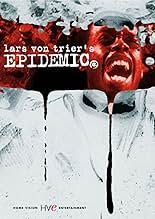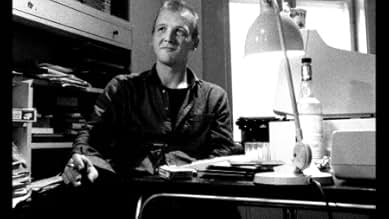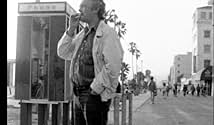CALIFICACIÓN DE IMDb
5.9/10
6.5 k
TU CALIFICACIÓN
Un director y un guionista se encuentran escribiendo un guion y, en el proceso, la línea entre la ficción y la realidad desaparece.Un director y un guionista se encuentran escribiendo un guion y, en el proceso, la línea entre la ficción y la realidad desaparece.Un director y un guionista se encuentran escribiendo un guion y, en el proceso, la línea entre la ficción y la realidad desaparece.
- Dirección
- Guionistas
- Elenco
- Premios
- 1 nominación en total
- Dirección
- Guionistas
- Todo el elenco y el equipo
- Producción, taquilla y más en IMDbPro
Opiniones destacadas
Another entry in my search to see a bunch of films about disease outbreaks, "Epidemic" is conceptually intriguing, but the actual execution is dreadful. It's amateurish, and Lars von Trier and Niels Vørsel, scenarists within and without the film, seem to have approached the entire thing as a joke; the end result being that the film itself is one. And, for crying out loud, take that damn red watermark of a title off the screen already! Seriously, the title, "Epidemic," along with an e in a circle, is in the upper left side of the image for most of the picture--and in red in an otherwise black-and-white film. I thought there was something wrong with the DVD or my home-viewing equipment--I'm still not entirely sure, because it makes no sense why the title would remain there for the rest of the whole movie. The lousy lighting and noisy photography, from what mostly seems to be 16mm film, is rather a blessing in this regard, as it sometimes obscures the ever present title in indiscernible darkness. Besides that, I also wanted to smack the smirks off their faces most of the time. Stop laughing, guys; none of this is amusing except, perhaps, for part of the ending. Aside from the Grand Guignol, my favorite part has the screenwriters' boss deploring the two's lack of a full script, for which they were hired, and deploring their film's ending, which he says is "pathetic" at best.
What there is is a skeleton of a script and a plotline painted on a wall. Literally, this is what is shown in the film for the writing of the film-within-the-film, also titled "Epidemic," and it's believable that's all they really did write for this entire film. I believe they mention this lack of planning in the DVD commentary, on which the two otherwise spend most of the time giggling at themselves giggling in the stupid movie. It's obnoxious. Hard to believe one of them, von Trier, went on to be the most famous Scandinavian filmmaker since Ingmar Bergman. Regardless, the premise of the thing was promising, of the film-within-the-film infecting the outer narrative--the movie as monster, as the source of the epidemic--as the writers in the outer one have likewise been infecting the inner film. These sort of meta narratives are catnip to me, so one needs to go out of their way or, rather in this case, not go out of their way at all, to dissuade me of it.
The film even begins with what seems to have been a waste of a good pun by not making clear that their script is lost to some sort of computer "virus," with the other sort of virus deadly to people occupying the film they decide to write after losing their previous effort, which apparently was so bad they can't even remember it so as to re-write the thing. From there, we get a shaggy-dog story--like the first car ride that goes nowhere, as do several of the film's other rambling detours. The texting while driving gag--with a typewriter (this being 1987) isn't bad. At least Udo Kier's scene is an interesting telling of his birthday, too, but otherwise we get pretentious wine tasting, a story of Vørsel's creepy correspondence with teenage girls from Atlantic City, and a woman hypnotized into the film-within-the-film who bawls and screams over how awful "Epidemic" is. I didn't think it was that bad, but it was a chore to finish it.
What there is is a skeleton of a script and a plotline painted on a wall. Literally, this is what is shown in the film for the writing of the film-within-the-film, also titled "Epidemic," and it's believable that's all they really did write for this entire film. I believe they mention this lack of planning in the DVD commentary, on which the two otherwise spend most of the time giggling at themselves giggling in the stupid movie. It's obnoxious. Hard to believe one of them, von Trier, went on to be the most famous Scandinavian filmmaker since Ingmar Bergman. Regardless, the premise of the thing was promising, of the film-within-the-film infecting the outer narrative--the movie as monster, as the source of the epidemic--as the writers in the outer one have likewise been infecting the inner film. These sort of meta narratives are catnip to me, so one needs to go out of their way or, rather in this case, not go out of their way at all, to dissuade me of it.
The film even begins with what seems to have been a waste of a good pun by not making clear that their script is lost to some sort of computer "virus," with the other sort of virus deadly to people occupying the film they decide to write after losing their previous effort, which apparently was so bad they can't even remember it so as to re-write the thing. From there, we get a shaggy-dog story--like the first car ride that goes nowhere, as do several of the film's other rambling detours. The texting while driving gag--with a typewriter (this being 1987) isn't bad. At least Udo Kier's scene is an interesting telling of his birthday, too, but otherwise we get pretentious wine tasting, a story of Vørsel's creepy correspondence with teenage girls from Atlantic City, and a woman hypnotized into the film-within-the-film who bawls and screams over how awful "Epidemic" is. I didn't think it was that bad, but it was a chore to finish it.
The idea of the film is great. Mixing the creation of a movie and his viewing. It's done in a very ambitious way, incredibly sophisticated and elegant when we know the budget who was assigned to the movie.
A lot of scenes are incredible, specially the one who shows the contamination of the priest, adding a reflection on the condition of the black man. Obviously the last scene is one of the most incredible things I've seen on a screen, but we can doubt the mental health of Von Trier and his crew. However maybe it's the reason he's so good...
I didn't like a few things. I think there is too much time about the creation of the movie, a few ridiculous and unappropriated moments as the story of the American letters of Niels
A lot of scenes are incredible, specially the one who shows the contamination of the priest, adding a reflection on the condition of the black man. Obviously the last scene is one of the most incredible things I've seen on a screen, but we can doubt the mental health of Von Trier and his crew. However maybe it's the reason he's so good...
I didn't like a few things. I think there is too much time about the creation of the movie, a few ridiculous and unappropriated moments as the story of the American letters of Niels
I obviously was in the right mood, since I don't give it a horrible mark. I do give it a 6 out of 10, because it is obviously such a low budget movie and it's definitely very original, but other than that, I am still amazed I watched it till the end.
Two screenwriters are trying to do in 5 days what they barely succeeded in one and a half years, that is write a script. They lost their original screenplay, which by now they can barely remember how it started, due to a bad disk. Each day is accompanied with scenes of their creative process, scenes from the movie they would do and dialogues with different people.
Now it happens that I've just written an IMDb comment that said "Funny little things: Udo Kier plays a short role in this movie, and he is really young". Deja vu! Udo Kier plays in this one, as well.
The movie is shot in black and white, probably by the same single camera, and the sound is almost not processed giving the whole movie a documentary like feeling. There are a lot of things written between the lines, the satire of the government and film industry being the most obvious.
Conclusion: you should watch this mostly if you're Danish. Else if you are a movie critic or deep into films. It is NOT a horror movie. A movie that has some gore at the very end is not horror. And also you have to have the right set of mind to watch it.
Two screenwriters are trying to do in 5 days what they barely succeeded in one and a half years, that is write a script. They lost their original screenplay, which by now they can barely remember how it started, due to a bad disk. Each day is accompanied with scenes of their creative process, scenes from the movie they would do and dialogues with different people.
Now it happens that I've just written an IMDb comment that said "Funny little things: Udo Kier plays a short role in this movie, and he is really young". Deja vu! Udo Kier plays in this one, as well.
The movie is shot in black and white, probably by the same single camera, and the sound is almost not processed giving the whole movie a documentary like feeling. There are a lot of things written between the lines, the satire of the government and film industry being the most obvious.
Conclusion: you should watch this mostly if you're Danish. Else if you are a movie critic or deep into films. It is NOT a horror movie. A movie that has some gore at the very end is not horror. And also you have to have the right set of mind to watch it.
Epidemic appears to be all stylistic self-indulgence. It is filmed in black and white, with often purposely redundant subtitles. Each shot is very very long. Some are stoic, some are suddenly goofy, some are disturbing, mostly stoic. When there is dialogue, it is intellectually stimulating, but borderline irrelevant.
Mainly, it is that director Lars Von Trier and his screenplay collaborator Niels Vorsel play themselves, coming up with a last-minute script for a producer. This strand takes disproportionate turns with scenes from their script, in which Von Trier plays a radical doctor attempting to cure a modern-day epidemic. In an warped turn, the doctor finds that he himself has been spreading it. For so long, one is left without a clue as to why there is such a coincidence between the screenplay and the outside world, or any progressions of the different narrative strands' signifying signs. But it infects you. It burns you.
Whether or not the film is narcissistic, it is not form over function. Essentially, it is a basic exercise in what metaphysically affects the viewer. Consider the scene of the darker, quieter of the screenwriters in the subway, knowing predeterminately that the other one is going to die. Or when he looks in a mirror, turns to us, the camera, then the mirror again. Everything one expects would create a cohesive, sense-making narrative film is inverted and indeed develops an immediately conscious connection between itself and the audience.
That is not to say it eschews any fundamental aspect of quality. Udo Kier delivers one of the most amazing, fantastic performances I have ever seen. Really, many of the performances, whoever these actors, or characters, are, shock and deeply move us. Some scenes are entirely made up of uproarious laughter or breakdowns of screaming, in spite of the unapologetic stoicism and quiet permeating the film.
This hypnotic abstraction is truly very atmospheric and creepy. It is a transcendental, almost physiologically affecting virus that infests you for days upon being subjected to it. It is something that has to be seen and can hardly be explained. And that makes it a true work of art.
Mainly, it is that director Lars Von Trier and his screenplay collaborator Niels Vorsel play themselves, coming up with a last-minute script for a producer. This strand takes disproportionate turns with scenes from their script, in which Von Trier plays a radical doctor attempting to cure a modern-day epidemic. In an warped turn, the doctor finds that he himself has been spreading it. For so long, one is left without a clue as to why there is such a coincidence between the screenplay and the outside world, or any progressions of the different narrative strands' signifying signs. But it infects you. It burns you.
Whether or not the film is narcissistic, it is not form over function. Essentially, it is a basic exercise in what metaphysically affects the viewer. Consider the scene of the darker, quieter of the screenwriters in the subway, knowing predeterminately that the other one is going to die. Or when he looks in a mirror, turns to us, the camera, then the mirror again. Everything one expects would create a cohesive, sense-making narrative film is inverted and indeed develops an immediately conscious connection between itself and the audience.
That is not to say it eschews any fundamental aspect of quality. Udo Kier delivers one of the most amazing, fantastic performances I have ever seen. Really, many of the performances, whoever these actors, or characters, are, shock and deeply move us. Some scenes are entirely made up of uproarious laughter or breakdowns of screaming, in spite of the unapologetic stoicism and quiet permeating the film.
This hypnotic abstraction is truly very atmospheric and creepy. It is a transcendental, almost physiologically affecting virus that infests you for days upon being subjected to it. It is something that has to be seen and can hardly be explained. And that makes it a true work of art.
Look, I know a substantial proportion of the American population get a little hot under the collar when funny-talking foreigners start criticising the American government and way of life, but hey - when you're the only country in the world inclined to and capable of dictation of world policy, you gotta take it on the chin. While Von Trier even makes me wince sometimes (the end credits to Dogville for instance), it's his point of view and is worthy of thought. He isn't here to lick your derrière clean for you - if you can't take a little criticism of the homeland, I'd steer clear of any imported movies for a while. Anyhoo, when truly disrespectful films like Titanic break records and reap awards with nary a raised eyebrow, it's double standards to expect non-US films to walk the line you'd like. Von Trier is a genius film-maker... you may not agree with his politics, but you cannot doubt his talent.
¿Sabías que…?
- Créditos curiososThe film's title appears in red letters in the upper left corner of the screen for the entire length of the film.
- ConexionesFeatured in The Making of 'Europa' (1991)
- Bandas sonorasTannhäuser (The Overture)
Composed by Richard Wagner
Selecciones populares
Inicia sesión para calificar y agrega a la lista de videos para obtener recomendaciones personalizadas
- How long is Epidemic?Con tecnología de Alexa
Detalles
Taquilla
- Total a nivel mundial
- USD 938
- Tiempo de ejecución1 hora 46 minutos
- Color
- Mezcla de sonido
- Relación de aspecto
- 1.66 : 1
Contribuir a esta página
Sugiere una edición o agrega el contenido que falta

Principales brechas de datos
By what name was Epidemic (1987) officially released in India in English?
Responda


















